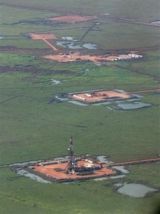South Sudan woos oil companies but risks linger
Mar 27, 2006 (NAIROBI) — A year of peace in Southern Sudan promises to unlock vast oil reserves left untapped by more than two decades of conflict, but oil majors hungry for new sources of energy are unlikely to swoop in just yet.
 The south, spurred by a 50-percent share in oil revenues under a deal ending what was Africa’s longest running civil war, is keen for more crude to be extracted to build a region crying out for everything from roads to sit-down toilets.
The south, spurred by a 50-percent share in oil revenues under a deal ending what was Africa’s longest running civil war, is keen for more crude to be extracted to build a region crying out for everything from roads to sit-down toilets.
To whet their appetites, investors at a recent conference in Nairobi were told that between 3 to 12 billion barrels of oil lay unexploited under the south’s swamps and savannah.
Yet Sudan remains a risky venture for Western oil companies despite the activity of Chinese, Malaysian and Indian players.
Experts say the longstanding threat of sanctions over strife in Sudan’s western Darfur region, an untested regulatory commission to oversee new oil contracts and political uncertainty are holding back investors.
“I would still consider it high risk even with all the assurances,” said a senior Kenyan official from an oil multinational, who attended the business conference.
“It’s not very clear whom you should do business with and how binding these agreements are. We can’t operate in an environment where certainty is not visible.”
Sudan currently produces some 500,000 barrels of crude oil a day, mainly from fields in the south with output projected to rise by 150,000 barrels per day this year.
WHITE NILE/TOTAL ROW
The uncertainty surrounding the south’s burgeoning oil sector is no better exemplified than in a dispute between UK oil explorer White Nile and French major Total SA
Shortly after the peace deal, the former southern rebel Sudan People’s Liberation Movement – now the southern government – granted White Nile rights to explore for oil on Block Ba.
But that 67,000 sq km tract is part of a block awarded to Total by Khartoum in a 1980 deal, renewed last year.
Complicating things is the fact that there is a new National Petroleum Commission, set up by the peace deal, to broker and approve all oil contracts.
But its jurisdiction over pre-existing contracts like Total’s is unclear, and the Petroleum Reserve Act giving Khartoum the sole right to hand out concessions has yet to be amended.
Investors fear that without clarification, the White Nile/Total row could be repeated.
“We hope there’s going to be an amicable solution. This conflict shouldn’t scare all the investors around the world,” Albino Akol Akol, minister of industry and mining for the Juba-based southern government, said.
POLITICAL RISK
And if the south decides to secede from the north at the end of a six-year interim period, investors wonder if deals signed between now and then would be upheld.
Another risk is whether U.S. pressure to force Khartoum to stop the killing in Darfur will gather pace. Washington imposed economic sanctions against Sudan in 1997 and has repeatedly pushed for U.N. sanctions on its oil industry.
Some oilmen, used to drilling no matter the political environment, said south Sudan was fertile ground.
“Our top concerns are the stability of the government in the south and relations between Juba and Khartoum — but all those risks are taken into account,” said one foreign oil executive, scouting for more concessions.
(Reuters)
